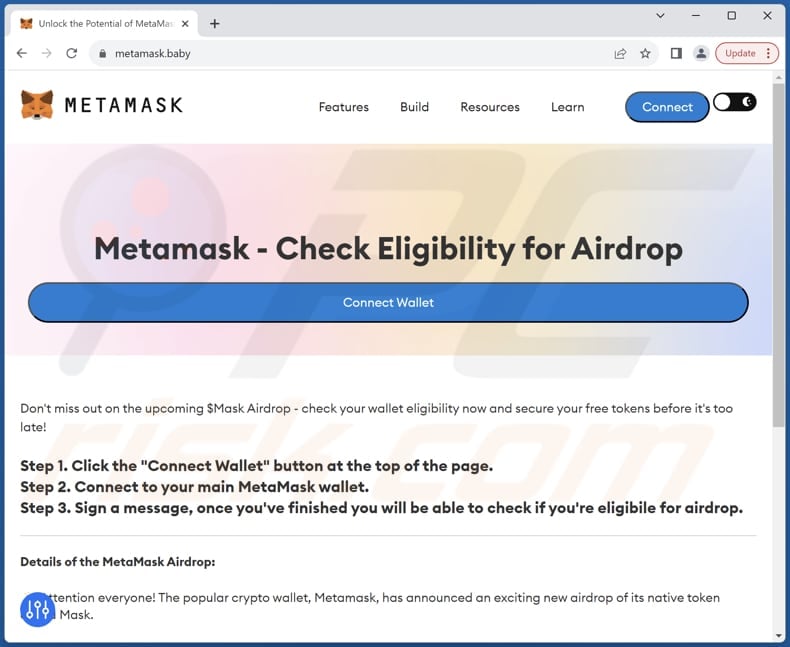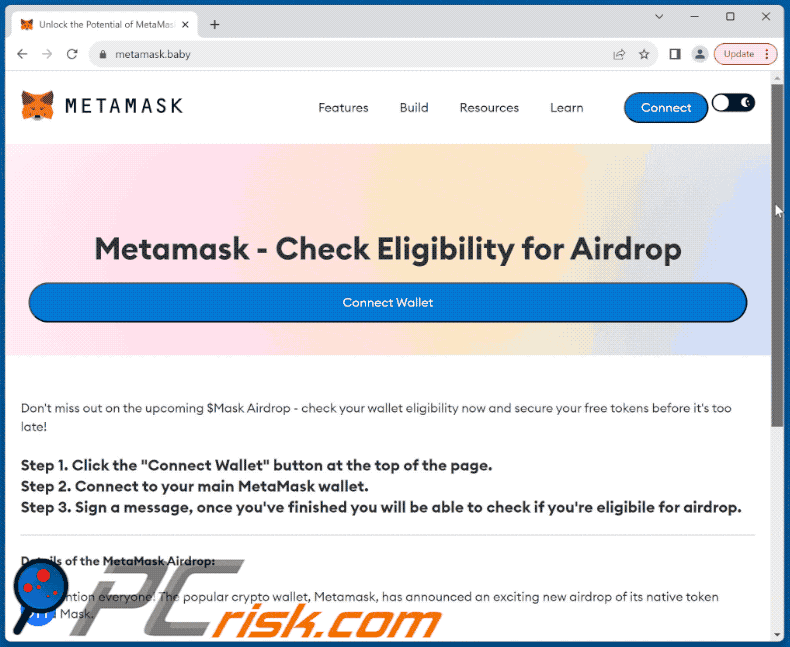How to identify fake giveaways like "Metamask Airdrop"
![]() Written by Tomas Meskauskas on (updated)
Written by Tomas Meskauskas on (updated)
What is the fake "Metamask Airdrop"?
After examining the page, we have determined that it is a fraudulent scheme posing as a platform for finding active airdrops. The website pretends to be a legitimate Metamask (cryptocurrency wallet software) page, providing instructions for users to take specific actions to assess their eligibility for a supposed giveaway. The primary aim of this scam is to steal cryptocurrency.

"Metamask Airdrop" scam in detail
The deceptive scheme operates through a misleading webpage falsely claiming association with MetaMask. This site promotes an alleged airdrop event related to a cryptocurrency named $Mask, urging users to verify their wallet eligibility for the event with a sense of urgency.
In order to participate, users are prompted to perform certain actions, such as "connecting" a wallet by providing login credentials. However, the entire setup is a ruse, as the page is designed to deceive users into approving a malicious contract. In reality, there is no legitimate airdrop, and the ultimate goal of the scam is to steal users' cryptocurrency holdings.
Following the guidelines on the page results in approving a carefully crafted malicious contract that triggers a crypto depletion mechanism (a cryptocurrency drainer). The objective of this drainer is to extract cryptocurrency from wallets. Once activated, the mechanism facilitates the transfer of digital currency from the targeted wallet to the scammer's wallet.
It is crucial to recognize that cryptocurrency transactions are typically irreversible, posing a challenge in tracing and reclaiming funds after the transfer is complete.
Also, it is worth noting that fraudulent activities associated with crypto depletion mechanisms (crypto drainers) are promoted in posts on X (previously known as Twitter). These messages are frequently composed using compromised accounts associated with real organizations, businesses, or public figures.
| Name | Metamask Airdrop fake crypto giveaway |
| Threat Type | Phishing, Scam, Social Engineering, Fraud |
| Fake Claim | Participants will be able to find crypto giveaways |
| Disguise | Legitimate MetaMask platform |
| Related Domain | metamask[.]baby |
| Detection Names (metamask[.]baby) | Avira (Phishing), CRDF (Malicious), Emsisoft (Phishing), Kaspersky (Phishing), Sophos (Phishing), Full List Of Detections (VirusTotal) |
| Symptoms | Lack of official verification, unrealistic claims, too good-to-be-true promises. |
| Distribution methods | Posts on X (Twitter), deceptive websites, rogue online pop-up ads, unwanted applications. |
| Damage | Loss of sensitive private information, monetary loss, identity theft, possible malware infections. |
| Malware Removal (Windows) | To eliminate possible malware infections, scan your computer with legitimate antivirus software. Our security researchers recommend using Combo Cleaner. |
Similar scams in general
In conclusion, fake crypto giveaways represent a pervasive threat within the digital landscape, preying on unsuspecting individuals seeking to capitalize on seemingly lucrative opportunities. These schemes often masquerade as legitimate promotions, employing deceptive tactics to lure users into divulging sensitive information or engaging in transactions.
As the crypto space continues to evolve, it becomes imperative for individuals to exercise caution, verify the authenticity of giveaways, and remain informed about potential risks to safeguard their assets in this dynamic digital landscape.
Examples of similar scams are "Jupiter Airdrop", "Coinbase Cashback", and "SatoshiVM Token Airdrop".
How did I open a scam website?
Most scams involving cryptocurrency drainers are promoted via fraudulent posts X (Twitter) written using compromised accounts. Users end up on websites designed to run drainers via links provided in those posts. Also, users may unwittingly open scam pages by clicking on deceptive links in phishing emails or interacting with shady advertisements.
Moreover, users can end up on scam sites via installed adware or pages associated with rogue advertising networks (e.g., illegal movie streaming pages or torrent sites). Notifications shown by unreliable pages can also lead to scams.
How to avoid visiting scam pages?
Be cautious of unsolicited emails, messages, and posts on social media with suspicious links. Verify website URLs before clicking, use reputable search engines, and rely on official sources for information. Employ reputable antivirus software and keep it updated to provide additional protection against malicious websites.
Do not trust advertisements on shady websites or allow pages of this kind to show notifications. Download apps from official pages and app stores and avoid downloads from other sources. If your computer is already infected with unwanted apps, we recommend running a scan with Combo Cleaner Antivirus for Windows to automatically eliminate them.
The appearance of "Metamask Airdrop" scam (GIF):

One of the messages on this page:
Metamask - Check Eligibility for Airdrop
Don't miss out on the upcoming $Mask Airdrop - check your wallet eligibility now and secure your free tokens before it's too late!
Instant automatic malware removal:
Manual threat removal might be a lengthy and complicated process that requires advanced IT skills. Combo Cleaner is a professional automatic malware removal tool that is recommended to get rid of malware. Download it by clicking the button below:
▼ DOWNLOAD Combo Cleaner
By downloading any software listed on this website you agree to our Privacy Policy and Terms of Use. To use full-featured product, you have to purchase a license for Combo Cleaner. 7 days free trial available. Combo Cleaner is owned and operated by Rcs Lt, the parent company of PCRisk.com read more.
Quick menu:
- What is Metamask Airdrop fake crypto giveaway?
- How to identify a pop-up scam?
- How do pop-up scams work?
- How to remove fake pop-ups?
- How to prevent fake pop-ups?
- What to do if you fell for a pop-up scam?
How to identify a pop-up scam?
Pop-up windows with various fake messages are a common type of lures cybercriminals use. They collect sensitive personal data, trick Internet users into calling fake tech support numbers, subscribe to useless online services, invest in shady cryptocurrency schemes, etc.
While in the majority of cases these pop-ups don't infect users' devices with malware, they can cause direct monetary loss or could result in identity theft.
Cybercriminals strive to create their rogue pop-up windows to look trustworthy, however, scams typically have the following characteristics:
- Spelling mistakes and non-professional images - Closely inspect the information displayed in a pop-up. Spelling mistakes and unprofessional images could be a sign of a scam.
- Sense of urgency - Countdown timer with a couple of minutes on it, asking you to enter your personal information or subscribe to some online service.
- Statements that you won something - If you haven't participated in a lottery, online competition, etc., and you see a pop-up window stating that you won.
- Computer or mobile device scan - A pop-up window that scans your device and informs of detected issues - is undoubtedly a scam; webpages cannot perform such actions.
- Exclusivity - Pop-up windows stating that only you are given secret access to a financial scheme that can quickly make you rich.
Example of a pop-up scam:

How do pop-up scams work?
Cybercriminals and deceptive marketers usually use various advertising networks, search engine poisoning techniques, and shady websites to generate traffic to their pop-ups. Users land on their online lures after clicking on fake download buttons, using a torrent website, or simply clicking on an Internet search engine result.
Based on users' location and device information, they are presented with a scam pop-up. Lures presented in such pop-ups range from get-rich-quick schemes to fake virus scans.
How to remove fake pop-ups?
In most cases, pop-up scams do not infect users' devices with malware. If you encountered a scam pop-up, simply closing it should be enough. In some cases scam, pop-ups may be hard to close; in such cases - close your Internet browser and restart it.
In extremely rare cases, you might need to reset your Internet browser. For this, use our instructions explaining how to reset Internet browser settings.
How to prevent fake pop-ups?
To prevent seeing pop-up scams, you should visit only reputable websites. Torrent, Crack, free online movie streaming, YouTube video download, and other websites of similar reputation commonly redirect Internet users to pop-up scams.
To minimize the risk of encountering pop-up scams, you should keep your Internet browsers up-to-date and use reputable anti-malware application. For this purpose, we recommend Combo Cleaner Antivirus for Windows.
What to do if you fell for a pop-up scam?
This depends on the type of scam that you fell for. Most commonly, pop-up scams try to trick users into sending money, giving away personal information, or giving access to one's device.
- If you sent money to scammers: You should contact your financial institution and explain that you were scammed. If informed promptly, there's a chance to get your money back.
- If you gave away your personal information: You should change your passwords and enable two-factor authentication in all online services that you use. Visit Federal Trade Commission to report identity theft and get personalized recovery steps.
- If you let scammers connect to your device: You should scan your computer with reputable anti-malware (we recommend Combo Cleaner Antivirus for Windows) - cyber criminals could have planted trojans, keyloggers, and other malware, don't use your computer until removing possible threats.
- Help other Internet users: report Internet scams to Federal Trade Commission.
Frequently Asked Questions (FAQ)
What is a fake cryptocurrency giveaway?
A fake cryptocurrency giveaway is a fraudulent scheme where scammers falsely claim to be conducting a giveaway or airdrop of a particular cryptocurrency. The scammers often pose as influential figures, projects, or companies within the cryptocurrency space to lend an air of credibility to their scheme.
What is the purpose of a fake crypto giveaway?
The ultimate goal of these scams is to deceive individuals into sending cryptocurrency or revealing personal information, allowing the scammers to steal funds or engage in other malicious activities.
How these scams are promoted?
These scams are typically promoted through various online channels, including social media platforms, forums, or phishing emails. Also, they are promoted via misleading ads, notifications from shady sites, and pages associated with rogue advertising networks.
Will Combo Cleaner protect me from pop-up scams?
Combo Cleaner is equipped with the capability to conduct extensive scans of all visited websites, effectively identifying malicious sites, including those linked to scams. The application promptly notifies users and limits access to unreliable websites.


▼ Show Discussion